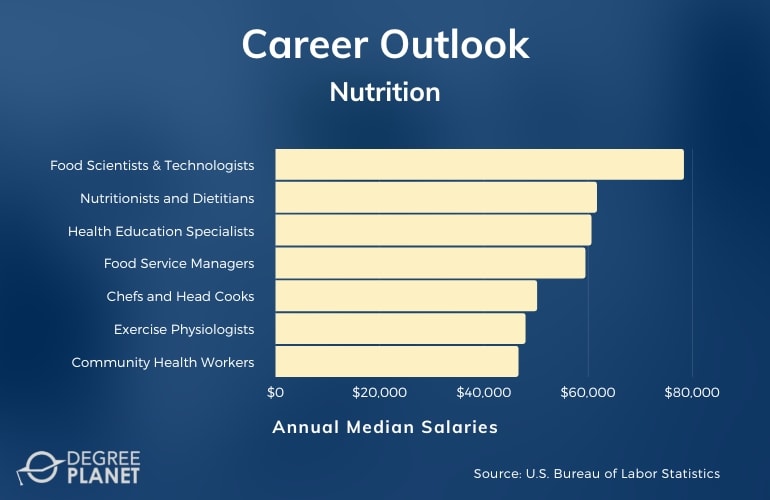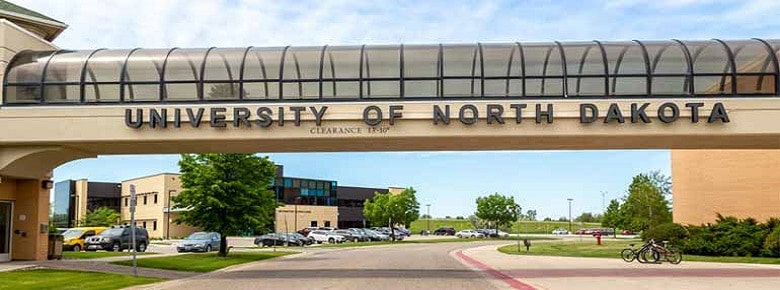A nutrition degree is designed to equip you with essential knowledge and skills to help individuals or groups maintain healthy lifestyles through positive eating habits.

Many students who seek a nutrition degree aspire to be a nutritionist or dietitian. This degree path can also be beneficial for related careers that involve promoting health and wellness.
Editorial Listing ShortCode:
If you’re interested in studying food and nutrition and wish to work closely with people to improve public health, you might consider pursuing a bachelor’s degree in nutrition.
Online Bachelors in Nutrition Degrees

A bachelor degree in nutrition can help prepare you to advise individuals or groups on how to eat healthy. Graduates may have the opportunity to work in a variety of health care settings.
The program is intended to help you develop a solid foundation of skills that can be applied to careers in the field, such as nutritionist, dietitian, or other related positions. Some of the key concepts and subjects explored in a nutrition bachelor degree can include:
- How to advocate for healthy eating habits
- Developing nutrition plans and resources
- Holistic nutrition
- Food safety
- Nutritional assessment and counseling
If you’re interested in food science and want to help others maintain a healthy lifestyle by offering nutrition advice to patients or clients, a degree in nutrition might benefit you.
Editorial Listing ShortCode:
Nutritionist degrees are commonly pursued by individuals who wish to become a nutritionist or dietitian. It can also be useful for other similar career paths, such as:
- Health education specialist
- Fitness instructor
- Community health worker
- Chef
- Food science technician
One of the main topics that a bachelors degree in nutrition focuses on is nutrition theory and educating others on how certain foods can affect their physical and mental health.
If you aspire to be a nutritionist, you can also consider different specialty areas for this profession, such as sports nutritionist, holistic nutritionist, or community nutritionist. Nutrition professionals can work in a variety of settings, such as:
- Hospitals
- Long-term care facilities
- Local and state health departments
- Schools
- Sports organizations
Graduates with a degree in nutrition are often equipped to inform individuals and the public about healthy food habits. You can also learn how to create and communicate nutrition plans that meet the health needs of an individual or community.
Nutrition Careers and Salaries

Enrolling in a nutrition bachelor’s degree program can help you develop skills and knowledge that may be applied to several career paths in the field.
Some programs offer concentrations that focus on a specific sector within the field. Salaries and job availability can differ depending on your level of education and experience as well as your location. According to the Bureau of Labor Statistics, here are some potential career paths related to the study of nutrition, along with their median salaries.
| Careers | Annual Median Salaries |
| Food Scientists and Technologists | $78,340 |
| Nutritionists and Dietitians | $61,650 |
| Health Education Specialists | $60,600 |
| Food Service Managers | $59,440 |
| Chefs and Head Cooks | $50,160 |
| Exercise Physiologists | $47,940 |
| Community Health Workers | $46,590 |
| Food Science Technicians | $46,590 |
| Fitness Trainers and Instructors | $40,700 |
| Home Health and Personal Care Aides | $29,430 |
Many students studying nutrition might be interested in a career as a nutritionist or dietician. Skills and knowledge acquired in nutritionist degrees can also be useful for health education specialists, fitness trainers, and chefs and caterers.
These professionals often give advice to individuals or groups on how to maintain a healthy lifestyle and offer suggestions on what kind of meals can help them reach their goals. A bachelor degree in nutrition can also help prepare you for a career in food science.
Editorial Listing ShortCode:
Those who aspire to be a food scientist may seek a bachelor’s in nutrition before pursuing an advanced degree. Food scientists study the elements of food, analyze nutritional values, and research ways to make foods more healthy and safe.
Nutrition Bachelors Curriculum & Courses

The curriculum of nutritionist degrees typically focus on several aspects of nutritional assessment, planning, and management. The following courses may be offered in a nutrition bachelor’s degree online:
- Nutritional Analysis and Assessment: You’ll study various equipment and methods used to analyze nutrition, eating disorders, and malnutrition.
- Nutrition Across the Lifespan: The focus of this course is to teach you about nutritional issues across the human lifespan and address special nutrition needs for specific ages and groups.
- Food Science: This course introduces you to the scientific study of food properties and elements.
- Food Safety: You’ll learn about key food safety and sanitation issues and principles, such as foodborne illnesses and pathogens and food allergens.
- Nutritional Counseling: You’ll learn about nutritional counseling, including the assessment of individuals or groups and gathering data.
- Food and Beverage Management: This foundational course introduces you to food and beverage operations, such as food production and quality standards.
- Vitamins, Herbs, and Natural Supplements: You’ll learn about common vitamins, herbs, and natural supplements as well as their benefits and safety issues.
- Nutrition Planning and Management: This course is designed to teach you about how to manage health and wellness through nutritional assessments and planning.
- Sports Nutrition: You’ll study applied nutrition as it relates to physiology, including how nutrition affects human body functions and its importance to help athletes enhance performance.
- Human Anatomy and Physiology: This course explores human body structure, function, and systems.
Your coursework is designed to teach you how to conduct nutritional assessments and wellness planning. It will also address nutritional and food safety issues you may encounter when you enter the work field.
How to Become a Nutritionist

There are a few routes you may consider taking to become a nutritionist, but one of the most straightforward paths includes these steps:
- Enroll in an accredited nutrition bachelor degree program. One of the first steps to becoming a nutritionist is enrolling in a bachelors program in nutrition or a related field. Some occupations may be pursued with an associate’s degree, but nutritionist and dietitian positions typically require at least a bachelors.
- Complete major coursework and defined credit hours. Some programs offer concentrations that allow you to focus on a specialty area within nutrition.
- Complete an internship (if required). Some programs may include an internship that you can complete along with your major coursework. An internship can help you gain professional experience in the field and may fulfill supervised field experience hours if becoming licensed is required in your state.
- Pursue certification and licensure (if required). If certification and licensure is required, this typically involves passing a certification and licensure exam, completing professional field experience, and completing a defined number of coursework hours.
Professionals who wish to become a registered dietician (RD) must earn certification and licensure before they’re able to practice in most states.
Requirements for nutritionists can vary by state. Some states allow professionals to be nutritionists without certification or licensure. Even if it’s not required, earning certification may help prove to employers that you’re qualified to perform nutritionist responsibilities.
Bachelor’s in Nutrition Admissions Requirements

Some common admissions requirements for a bachelor’s in nutrition include:
- High school diploma or GED
- Official transcripts
- SAT or ACT scores (if required)
- Letters of recommendation
Admissions offices typically ask students to submit any official transcripts they have as proof of high school completion and previous education. Some schools request SAT or ACT scores and may consider a minimum score as part of admission. Letters of recommendation from employers, teachers, or other professionals can provide insight on how you perform as a student.
Nutritionist Programs Accreditation

Accreditation status can be an important factor to consider when choosing between prospective schools. Regional accreditation is proof that schools and programs meet high-quality standards set forth by regional accrediting organizations.
Editorial Listing ShortCode:
If you’re interested in pursuing certification and licensure as a nutritionist or dietitian, an accredited education is a common prerequisite to receiving these credentials from a certification board. Attending an accredited institution is also an eligibility requirement for receiving federal financial aid. Plus, some employers take accreditation into consideration when reviewing job candidates.
Nutrition Licensure and Certifications

If you’re interested in becoming a licensed nutritionist or registered dietitian, you can check with your state board to discover their specific licensure and certification requirements.
Here are some common criteria:
- Possess at least a bachelor’s degree from an accredited institution
- Complete a defined number of credit hours in specific subject areas
- Have supervised professional experience
- Pass a certification or licensure exam
Certification and licensure requirements for nutritionists and dietitians can vary by state. Nutritionists may seek a certified nutrition specialist (CNS) certification. RD certification may be obtained by professionals who wish to be a registered dietitian.
Financial Aid and Scholarships

Financial aid and scholarships can be used to help cut down the upfront costs of tuition and various school expenses. Financial aid is income-based assistance that can be distributed at the state or federal level. To find out if you’re eligible for federal financial aid, you can submit a Free Application for Federal Student Aid (FAFSA).
Scholarships are opportunities for students to potentially receive monetary awards from various organizations. The application process for scholarships can vary between different scholarship programs. Some scholarships are based upon merit or specific groups, while others may be less exclusive.
Is Nutrition a Good Major?

Yes, nutrition is a good major for many undergraduate students. You might find this program interesting if you have an interest in learning about physical and mental wellbeing in relation to nutrition and eating habits.
Majoring in nutrition could introduce you to several career paths that involve working closely with individuals and communities to make a positive impact on public health. According to the Bureau of Labor Statistics, the median annual salary for nutritionists and dieticians is $61,650.
A nutrition program can also be beneficial for people who aspire to be chefs, food science technicians, or health education specialists.
What Is a Nutritionist?

A nutritionist is an expert who promotes health and wellness through the use of food and nutrition. They’re advocates for healthy food habits and advise individuals or groups on how certain foods can affect their mental and physical health.
Nutritionists may specialize in a specific type of nutrition, such as pediatric nutrition, community nutrition, or sports nutrition. These professionals can offer advice and education on how others can eat healthy by addressing issues based on the goals or needs of their patient or client.
What Does a Nutritionist Do?

The responsibilities of a nutritionist can vary depending on where they work and whether they specialize in a specific area.
Common duties of a nutritionist can include assessing the health and needs of a patient. They can develop nutrition plans and resources, counsel clients or patients on healthy eating habits, and monitor outcomes of nutrition plans. Some nutritionists may focus on a specific area, such as pediatrics, gerontology, sports, or community nutrition.
Editorial Listing ShortCode:
Pediatric nutritionists specialize in developing nutrition plans for children to make sure they’re getting the proper nutrients they need.
Where Does a Nutritionist Work?

Most nutritionists work in state, local, and private hospitals. They’re also employed by the government and work in public health departments. Some nutritionists work in nursing and residential care facilities or outpatients care centers. Some are self-employed.
Sports nutritionists may work for sports organizations. Nutritionists can also work in research settings and school districts. The type of work environment a nutritionist works in can differ depending on their location, interests, and area of specialty.
What Degree Do You Need to Be a Nutritionist?

Nutritionists are typically required to hold at least a bachelor’s degree. A nutritionist bachelor program includes foundational coursework on nutrition theory and concepts that help prepare you to enter the field.
You can also consider a bachelor’s degree in nutrition as a stepping stone to an advanced degree. Earning a graduate degree in nutrition might expand your job and certification opportunities. Certification and licensure requirements for nutritionists can vary by state. Some credentials require applicants to hold graduate degrees, while others can be obtained with a bachelors.
What Can You Do with a Degree in Nutrition and Dietetics?

Graduates who are interested in helping others maintain a healthy lifestyle might seek a career as a nutritionist or dietician.
Professionals can specialize as a clinical or community nutritionist or dietician to provide nutrition therapy, create nutritional programs, and counsel individuals on nutrition and health. Fitness instructors could benefit from a nutrition degree because it can help them advise clients on nutrition plans that coordinate with exercise regimens.
If you’re interested in advocating for healthy eating habits and educating others, you might consider a career as a community health worker, teacher, or health education specialist. Some graduates on an undergraduate program continue on and enroll in an on-campus or online masters in nutrition program offered at a growing number of universities.
How Long Does It Take to Get a Bachelor’s Degree in Nutrition Online?

A bachelor in nutrition and dietetics degree generally takes 4 years to complete if you follow a traditional 16 week semester and attend full-time. Students who complete additional credit hours each semester may be able to finish earlier.
Editorial Listing ShortCode:
If you’re enrolled year-round in an 8 week semester program, you may be able to finish in less time. Studying part-time, though, could extend your time to completion. A standard bachelor’s degree program includes a minimum of 120 credit hours. Some programs may include additional credit hours, which could take longer to complete.
What’s the Difference Between a Dietician vs. Nutritionist?
A dietician and nutritionist may perform similar duties, but there are some key differences between these careers.
| Dietician | Nutritionist |
|
|
Some states don’t require nutritionists to be certified or licensed, while most states require these credentials to practice as a dietician. Dieticians focus on assessing and diagnosing medical conditions in relation to eating habits, whereas a nutritionist promotes healthy eating habits and offers general nutrition advice.
Is an Online Nutrition Degree Worth It?

Yes, an online nutrition degree is worth it for many professionals. Nutritionist degrees can help prepare you to enter the workforce as an advocate for healthy eating habits and general wellness. You might be interested in a nutrition degree if you enjoy working closely with others and wish to educate people on the benefits of healthy eating and nutrition.
Editorial Listing ShortCode:
According to the Bureau of Labor Statistics, nutritionists and dieticians are projected to experience a 7% job increase over the next ten years. Increasing public interest in preventative care and general nutrition wellness is one of the main reasons for this expected job growth.
Universities Offering Online Bachelors in Nutrition Degree Programs
Methodology: The following school list is in alphabetical order. To be included, a college or university must be regionally accredited and offer degree programs online or in a hybrid format.

American Public University offers a Bachelor of Science in Public Health. Students can specialize in Public Health Informatics, Nutrition and Wellness, Emergency and Disaster Management, or General Public Health Studies. This program is housed fully online. Potential classes include Public Health in America, Leadership and Motivation, and Foundations of Nutrition.
APUS is accredited by the Higher Learning Commission.

Appalachian State University offers a Bachelor of Science in Nutrition and Foods. This program may be an excellent fit for students interested in pursuing a nutrition-related career without becoming a registered dietitian. The program requires the completion of 120 credits. Students may choose part-time or full-time schedules. All classes meet entirely online.
Appalachian State University is accredited by the Commission on Colleges of the Southern Association of Colleges and Schools.

Arizona State University offers an online program for a Bachelor of Science in Food and Nutrition Entrepreneurship. This curriculum is designed to equip students with the skills to harness their passion for food and nutrition in pursuit of business opportunities. Classes are 7.5 to 15 weeks long. Students can typically complete the program’s 120 required credits in 4 years.
ASU is accredited by the Higher Learning Commission.

Bellevue University offers a Bachelor of Science in Health Science. This interdisciplinary program may be a good fit for students interested in healthcare, nutrition, or other health-related careers. The program utilizes an online learning format and requires the completion of 127 credits. Students may select their electives to better tailor their education to their professional goals.
Bellevue University is accredited by the Higher Learning Commission.

Eastern Michigan University offers a combined Bachelor and Master of Science in Dietetics program. It is designed for students who intend to obtain their registered dietician credentials. The program utilizes a hybrid on campus and online class format that is complimented by hands-on experience in the field. Students can typically finish the combined degree requirements in 5 years.
Eastern Michigan University is accredited by the Higher Learning Commission.

Grand Valley State University offers a combined Bachelor of Science in Applied Food and Nutrition and Master of Science in Clinical Dietetics program. It is designed for students interested in accelerating their careers in the dietetics field. Students can attend fully online or through a hybrid online and in-person format. The program requires the completion of 164 credits. Each class is 15 weeks long.
Grand Valley is accredited by the Higher Learning Commission.

Indiana University offers a Bachelor of Science in Health Sciences. This curriculum is designed to help students develop a broadly applicable knowledge base and set of skills for diverse careers in healthcare. Students must complete a minimum of 120 credit hours to graduate. Classes meet primarily online with some in-person requirements.
Indiana University is accredited by the Higher Learning Commission.

Kansas State University offers a Bachelor’s in Nutrition and Health. Students can pursue interests in subcategories of the discipline through their chosen classes.
Classes are offered in topics such as personal wellness, allergies and intolerances, clinical nutrition, healthcare administration, and nutrition for athletes. The curriculum requires the completion of 120 credit hours, which can typically be finished in 4 years of full-time study. All classes meet online.
Kansas State University is accredited by the Higher Learning Commission.

Liberty University offers a Bachelor of Science in Health Sciences. This curriculum combines unique biblical perspectives with practical skills needed in a variety of healthcare-related professions. Classes meet online, and each one is 8 weeks long. On average, students can complete the program’s 120 required credit hours in 3.5 years when attending full-time.
Liberty University is accredited by the Southern Association of Colleges and Schools Commission on Colleges.

Merrimack College offers a Bachelor of Science in Nutritional Sciences. At the core of the curriculum is the analysis of the relationship between food and health and how it impacts individuals and the world. In addition to coursework, students must complete at least one internship, clinical practicum, or field experience to graduate.
Merrimack College is accredited by the New England Commission of Higher Education.

National University of Natural Medicine offers an accelerated combined Bachelor to Master of Science in Nutrition program. It aims to graduate individuals with an understanding of integrative health practice. Students must complete at least 128 credits to graduate. The program utilizes asynchronous online learning methods to accommodate students’ scheduling needs.
The National University of Natural Medicine is accredited by the Northwest Commission on Colleges and Universities.

Oklahoma State University offers a Bachelor of Science in Nutritional Sciences. This program may be an ideal next step for students pursuing careers in public health nutrition. The curriculum consists of 120 credit hours, all of which can be completed online. Many graduates pursue roles in schools, hospitals, non-profit organizations, or government agencies.
Oklahoma State University is accredited by the Higher Learning Commission.

Purdue University offers a Bachelor of Science in Nutrition. The curriculum covers topics like pharmacology, physiology, metabolism and nutritional needs, and professional skills. Classes meet online, and each one is 10 weeks long. Students can expect to devote 15 to 18 hours weekly to coursework, typically completing the degree in 4 years of full-time study.
Purdue University is accredited by the Higher Learning Commission.

Tarleton State University offers a Bachelor of Science in Nutrition Science. Students can select a concentration in Dietetics or Food and Nutrition, allowing them to personalize their education to their goals. Potential courses include Food and Culture, Principles of Food Preparation, and Advanced Meal Management. Most students can complete the program’s 120 required credits in 4 years.
Tarleton State University is accredited by the Southern Association of Colleges and Schools Commission on Colleges.

Texas Woman’s University offers a Bachelor of Science in Nutrition. This program is designed for students intending to pursue certification as a Registered Dietitian Nutritionist. The curriculum spans 120 credit hours. After completing the required coursework, students must complete a dietetic clinical internship and a graduate degree to sit for board examination.
TWU is accredited by the Southern Association of Colleges and Schools Commission on Colleges.

The Bachelor of Science in Health Sciences program at Touro University Worldwide offers a concentration in Nutrition and Health. This curriculum aims to help students develop the skills needed to promote health broadly. On average, students can complete the program’s 120 required credit hours in 3.5 years of full-time study. Classes meet 100% online, and they are typically 8 weeks long.
Touro University is accredited by the Middle States Commission on Higher Education.

The University of Alabama offers a Bachelor of Science in Food and Nutrition. The curriculum considers the relationship between human health and nutrition, seeking to equip students with the expertise to improve their clients’ well-being. This program utilizes an online learning model. Classes cover key concepts like human life cycle, community nutrition, and food service management.
The University of Alabama is accredited by the Southern Association of Colleges and Schools Commission on Colleges.

The University of Alaska—Anchorage offers a Bachelor of Science in Dietetics. The program aims to develop students’ understanding of medical nutrition therapy, community nutrition, food service management, and culinary medicine. Students can attend classes online or on campus. Many graduates pursue entry-level allied health roles upon graduation or further education toward dietetic certification.
UAA is accredited by the Northwest Commission on Colleges and Universities.

The University of Arizona offers a Bachelor of Science in Nutritional Sciences. Students can select an emphasis in Nutrition or Dietetics depending on their future goals for certification and employment. All classes meet 100% online. Students must complete a minimum of 120 credit hours to graduate.
The University of Arizona is accredited by the Higher Learning Commission.

The University of Kansas offers a Bachelor of Health Sciences. This degree may be an excellent fit for individuals pursuing entry-level roles or further education in public health, hospital administration, or nutrition and dietetics. Students can select a specialization in Nutrition, Public and Population Health, or Health Management and Policy. The program is held fully online.
The University of Kansas is accredited by the Higher Learning Commission.

The University of Missouri offers an online program for a Bachelor of Science in Fitness Programming and Management. Students with a passion for improving physical wellness in their communities may find a good fit in this program. The curriculum spans 120 credit hours. Potential classes include Introduction to Human Physiology, Exercise Techniques, Genetic Diseases, and Personal Health and Wellness.
The University of Missouri is accredited by the Higher Learning Commission.

The University of North Dakota offers a Bachelor of Science in Human Nutrition. The curriculum covers topics like nutrition through the life cycle, nutritional biochemistry, world food patterns, and research methods. Classes are held asynchronously online with online modules, virtual learning libraries, and recorded lectures. Most students can graduate in just 4 years.
UND is accredited by the Higher Learning Commission.

The University of Northern Colorado offers a Bachelor of Science in Nutrition and Dietetics. Students can choose to specialize in Nutrition or Dietetics depending on their long-term career goals. The program requires the completion of 120 credits. After completing the required coursework, students must complete a year-long dietetic internship to become registered dieticians.
The University of Northern Colorado is accredited by the Higher Learning Commission.

Weber State University offers a Bachelor of Science in Nutrition Education. Graduates often pursue careers as registered dietician nutritionists, athletic trainers, public health nutritionists, physician assistants, or researchers. Students must complete a minimum of 120 credit hours while maintaining a 2.75 GPA or higher. The program is housed primarily online.
Weber State University is accredited by the Northwest Commission on Colleges and Universities.

William Paterson University offers a Bachelor of Science in Health Studies that can be earned online. This program may be an excellent option for students interested in pursuing careers in diverse healthcare-related fields. Students can attend classes fully online. The curriculum covers broad health concepts, including nutrition, disease, substance abuse, and human sexuality.
William Paterson University is accredited by the Middle States Commission on Higher Education.
Getting Your Bachelors Degree in Nutrition Online

A bachelors degree in nutrition can help prepare you for a career in promoting nutrition wellness. Nutrition professionals can help individuals and communities develop and maintain healthy lifestyles through positive eating habits.
If you’re passionate about public health and helping others meet their goals, you might consider pursuing a degree in nutrition. A nutrition bachelors degree is one of the first steps you may take toward becoming a nutritionist or dietician. It can also be beneficial for other related careers in the field.
You can begin your journey toward a career in nutrition by researching accredited schools and bachelor degrees in nutrition that align with your goals and interests.

